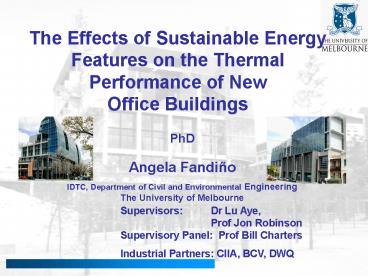PhD - PowerPoint PPT Presentation
1 / 22
Title:
PhD
Description:
BAU scenario for the commercial building sector predicts an increase ... Dismantling - Transport - Lighting - Heating - Cooling - Resource services (hot water) ... – PowerPoint PPT presentation
Number of Views:42
Avg rating:3.0/5.0
Title: PhD
1
The Effects of Sustainable Energy Features on the
Thermal Performance of New Office Buildings
PhD
Angela Fandiño IDTC, Department of Civil and
Environmental Engineering The University of
Melbourne
Supervisors Dr Lu Aye, Prof Jon
Robinson Supervisory Panel Prof Bill Charters
Industrial Partners CIIA, BCV, DWQ
2
Presentation Outline
- Introduction
- Research methodology
- Thermal comfort
- Energy consumption
- Embodied energy LCEA
- Optimisation
- Expected outcomes
3
Introduction (cont.)
- In Australia
30 of all raw materials 40 of all energy
produced
40 of all air emissions
- BAU scenario for the commercial building sector
predicts an increase in energy related GHG
emissions from a level of 32 Mt per annum in the
year 1999 to 63 Mt for the year 2010
4
Introduction (cont.)
Considerable scope to improve environmental
performance of commercial buildings by
- increasing resource efficiency
- increasing energy efficiency
- reducing ecological footprint
- reducing GHG emissions
Philip Merrill Envi. Centre NY
San Francisco Public Library
Swiss Re Building, London
5
Construction Industry
- Building codes
- Energy rating systems
- Building design guides
- To measure and promote the merits of sustainable
construction
6
SEFs
- green elements and/or characteristics capable of
reducing the amount of energy consumption,
pollutant emissions and environmental impacts
generated by the building throughout its life
cycle, - environmentally friendly, made in a sustainable
way, using resources wisely.
Examples North orientation, high performance
double glazing, high shading coefficients, low
u-values and energy efficient HVAC.
7
Problem Statement
Thermal Performance
Sustainable Energy Features
- energy consumption
- environmental impact from building materials
- thermal comfort
8
Aim
The aim of the project is to quantify the effects
of sustainable energy features on the thermal
performance of new office buildings.
9
Objectives
- To develop building simulation model that
quantifies life cycle energy (embodied
energy operational energy). - To apply an optimization technique with the model
developed to identify the set of optimal
variables which provide minimum energy
consumption (subject to thermal comfort).
10
A
B
Methodology
11
Methodology
12
Thermal Comfort
Measurements
McCoy WS
ambient temperature, relative humidity, local
wind speed, wind direction measurements
13
Thermal Comfort
Simulation
TRNSYS Simulation
14
Methodology
15
Energy Consumption
Audit Simulation
- an energy audit has being undertaken AS/NZS
35982000. Each audit involved - visits to the building,
- analysis of energy sub-meters to understand the
distribution of energy in the building, - analysis of the sites energy use.
16
Energy Audit BA BB
Electricity
17
Energy Audit BA BB
Gas
18
Methodology
19
LCEA
Source U.S. Department of Energy High
Performance Buildings Database
20
LCEA
Embodied energy Operational Energy
21
Expected outcomes
- Opportunity to develop a building simulation
model to quantify the effects of SEFs on the
thermal performance of office buildings - Better understanding of the characteristic
behaviour of SEFs. - A benchmark derived from the relationship
between sustainable energy design features and
buildings thermal performance, to be used in
decision making process in development of new
office buildings.
22
MANY THANKS































